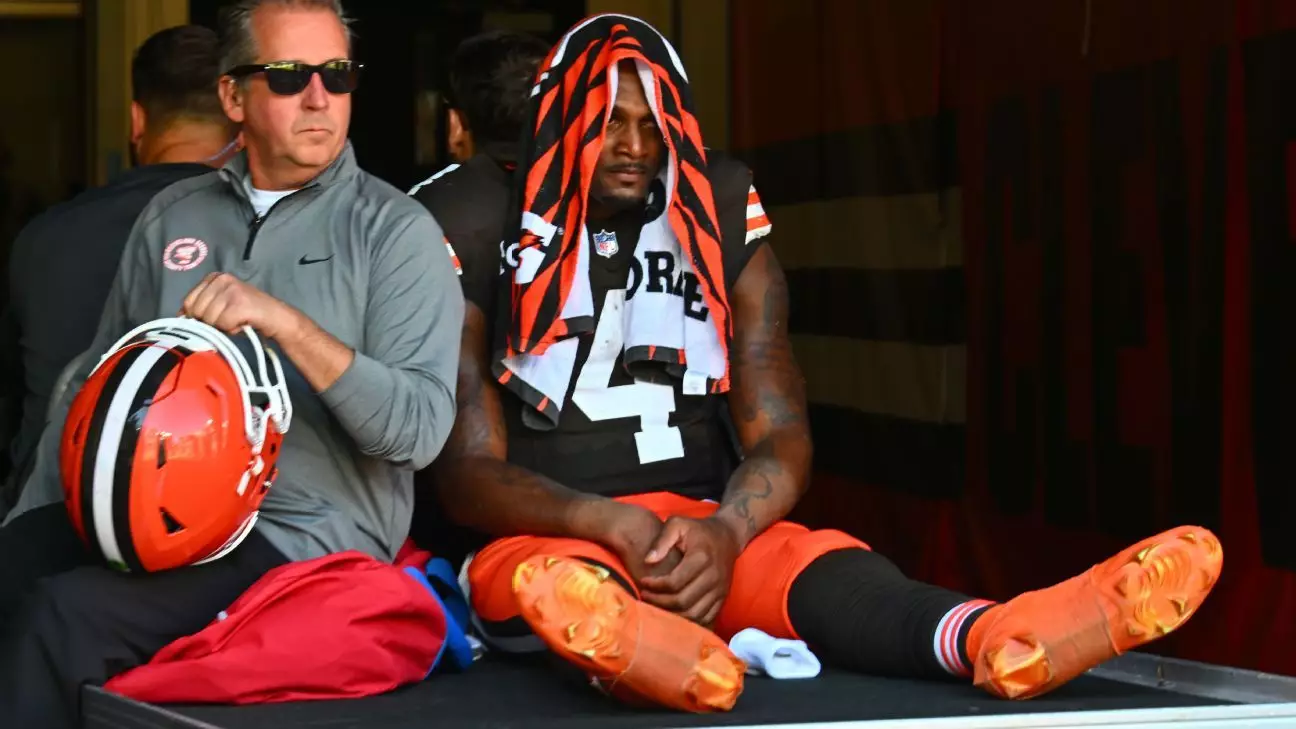The Cleveland Browns’ season prospects took a significant hit following the revelation that quarterback Deshaun Watson has suffered a ruptured right Achilles tendon, an injury that will keep him out for the remainder of the season. The coaching staff, led by Kevin Stefanski, had intimated about the severity of the injury during the team’s 21-14 defeat to the Cincinnati Bengals. Observers noted Watson’s leg hyperextending in a non-contact situation, a heart-stopping moment that led to his immediate withdrawal from the game. His visibly emotional departure on a cart resonated deeply with teammates, drawing the entire sideline to his side—a moment marked by unity amid distress.
In professional sports, injuries can disrupt team cohesion and morale. The dynamics of the Browns are now under scrutiny as they must adapt to the loss of their starting quarterback. Watson’s injury not only places pressure on the backup quarterbacks, Dorian Thompson-Robinson and Jameis Winston, but it raises concerns about the overall stability and performance of the team as they look forward to the remainder of the season.
One of the troubling aspects highlighted in the aftermath of Watson’s injury was the reaction from some fans. Reports indicated that cheering erupted in the stands when Watson went down, eliciting strong criticisms from players and coaches alike. Defensive end Myles Garrett voiced his discontent, reminding fans that cheer should never arise from an opponent’s misfortune, much less from an injury to a player on your team. This sentiment was echoed by Stefanski, who lamented the disgrace of any supporter taking pleasure in such circumstances.
The paradox of fandom was evident in this situation. Many supporters seem unwilling to overcome their prejudices against Watson, influenced by the complexities of his past concerning legal troubles and his controversial contract with the Browns. The loud cheers for running back Nick Chubb’s return served as a stark contrast to the reactions toward Watson. This division among fans is not unusual, but it speaks to a broader issue of loyalty and empathy within sports culture.
Following Watson’s departure, second-year quarterback Dorian Thompson-Robinson took the field but struggled significantly, completing only 11 of 24 passes with two interceptions. To add insult to injury, he suffered a finger injury later in the game, leaving the Browns’ offensive plans in disarray. Winston was subsequently thrust into action, albeit with a mixed performance marked by a modest but crucial touchdown connection with tight end David Njoku.
In the wake of Watson’s injury, the question of who will lead the Browns into their upcoming game against the Baltimore Ravens looms large. While Stefanski’s decision to start Thompson-Robinson reflects confidence in young talent, it has also raised apprehensions about the overall readiness of the team’s backup plan. Teams often rely heavily on their starting quarterbacks; thus, the ability of Thompson-Robinson or even Winston to step up could dictate the trajectory of the Browns’ season moving forward.
The injury closes out another tumultuous chapter for Watson in what has indeed been a rollercoaster tenure with the Browns. His third year in Cleveland sees him grappling with not only the physical toll of injuries but also the lingering controversies surrounding his past. The stark reality of having just 19 starts under a lucrative five-year deal raises questions about his future with the franchise. The Browns, financially bound to Watson with significant salary implications, may find themselves in a precarious position as they navigate his recovery process and contractual obligations.
The 2023 season—once ripe with promise—now teeters on the brink of uncertainty. As Watson’s legacy in Cleveland continues to unfold, fans and analysts alike will keenly watch how the organization responds in this time of adversity. The fallout of his injury could indeed shape the future landscape of the franchise both on the field and in the hearts of its supporters.


Leave a Reply